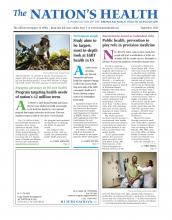Health workers may need to do a better job at educating new mothers about practices that keep their babies safe and healthy, such as breastfeeding, according to a recent study.
Of more than 1,000 new mothers, roughly 20 percent said they received no advice from a doctor on infant sleep positions and breastfeeding, according to research published online July 27 in Pediatrics.
Additionally, 50 percent or more of new mothers said they received no advice about pacifier use and appropriate places for infants to sleep. Regarding sleep, infants are recommended to sleep on their backs to avoid the risk of sudden infant death syndrome.
Reasons why new mothers do not receive advice on such topics vary, said Staci Eisenberg, MD, the lead study author and a pediatrician at Boston Medical Center.
“There may be times that the conversation isn’t happening or…it may be some combination of lack of knowledge of the exact recommendations,” Eisenberg told The Nation’s Health. “It may be some doctors don’t agree with recommendations. I think many times it may also be that the health care providers are giving information, but not in a way that’s clear and specific enough to be remembered.”
Researchers asked mothers of infants ages 2 to 6 months whether they received advice on breastfeeding, immunization, pacifier use and sleep positions and locations from doctors, birth hospital nurses, family and the media. Researchers also evaluated whether the advice that was given fell in line with recommendations from expert groups such as the American Academy of Pediatrics.
Ten to 15 percent of advice doctors gave about breastfeeding and pacifier use was not in line with recommended practices, the study said. Additionally, more than 25 percent of the advice on how and where an infant should sleep did not meet recommendations, the study said.
Mothers said they received advice from family members 30 percent to 60 percent of the time. However, more than 20 percent of that advice on breastfeeding and about two-thirds of the advice about pacifier use and how and where infants should sleep went against expert opinions, the study said.
Seventy percent of mothers said they received advice from the media on breastfeeding but roughly 20 percent of that advice did not match with expert advice, the study said.
“It really points to an important opportunity for the public health community to reach out to media and be proactive and engage with families in finding other ways than just in the doctor’s office to communicate important health information,” Eisenberg said.
To view the study, visit http://pediatrics.aappublications.org/content/early/2015/07/21/peds.2015-0551.full.pdf+html.
- Copyright The Nation’s Health, American Public Health Association









